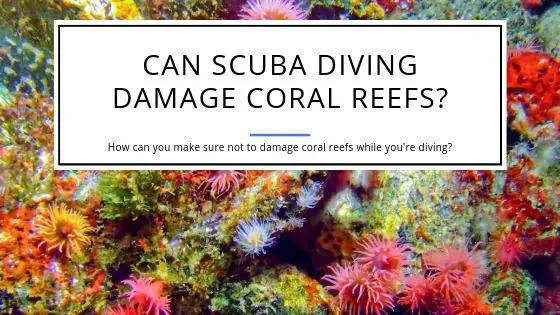Can Scuba Diving Damage Coral Reefs?
Coral reefs are one of nature’s greatest gifts. These stunning carbon structures not only add to the beauty of the ocean, but they also play a pivotal role in maintaining a balance in the ecosystem.
Can Scuba Diving Damage Coral Reefs? Yes, it absolutely can. If a diver is not careful and touches the corals or has the equipment touch them, then the corals will suffer and die. Leaving trash behind or losing small items also damages the coral.
These colorful animals (yes, they’re animals!) act as the flower garden of the ocean and provide a home to many small and growing fish.
What Are Coral Reefs?
You’re probably still a bit taken aback by the fact that coral reefs are actually animals. In fact, a single coral is made up of countless tiny animals known as polyps.
Polyps may be as small as a speck of sand or may go up to a size of around 10 inches. They pick up calcium carbonate from the water and clump together to form coral reefs.
If you’ve ever seen a movie or a documentary with corals in it, or actually gone diving to see them, you would have noticed that some corals stand up straight like buildings while others sway around with the water current.
These are hard and soft corals. Coral reefs are generally made up of hard corals.
What is the Lifespan of Corals?
Since corals are living organisms, they need a source of food for survival. For some, it’s tiny fish and plankton while others feed off the algae that grow onto their outer layer. Corals expand by giving birth to coral eggs.
While coral reefs may be thousands of years old, individual corals can stay alive for a few years. They are sensitive organisms and minor factors, such as changing water temperatures, or excess exposure to the rays of the sun or even strong waves in the water can kill them. They can also be eaten by many other sea creatures.
The Importance of Corals
Coral reefs may cover a very small percentage of the world’s ocean floor, but nearly a fourth of all marine life rely on coral reefs for protection and nourishment during their early stages of development. Countless species of fish seek refuge in coral reefs. Larger coral reefs encourage the growth of new corals.
Coral reefs also protect the coastline from the impact of natural disasters and add to the scenic beauty of the ocean.
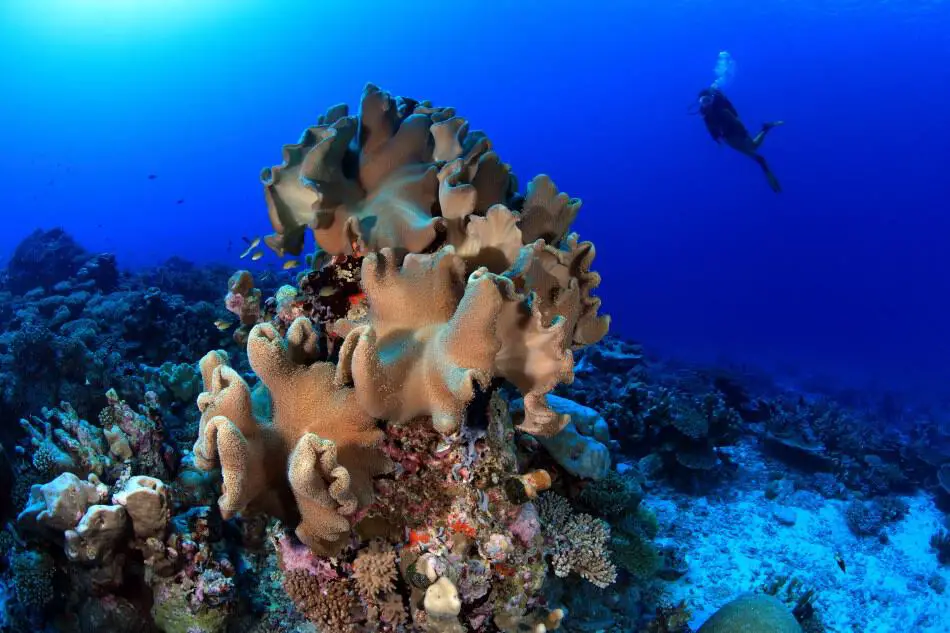
Are Coral Reefs Endangered?
Coral reefs don’t just look beautiful, but they’re an essential part of the world’s ecosystem. From reducing the impact of hurricanes and storms to being a safe haven for many sea creatures, they’re important for both people and animals.
However, with the growing human population and the effects of global warming, coral reefs are deteriorating at an alarming rate. There are many factors contributing to their destruction:
Fishing
For many people around the globe, fishing is a source of income and sustenance. With increasing demand, overfishing has become a real problem.
Modern fishing techniques not only increase fishing yield, but they also damage the coral reefs along the way. These reefs are a safe space for many new-born and tiny fish.
Global Warming
With the overall changing climates, the ocean is also affected. Coral reefs can detect minor temperature changes, which can cause them to lose color.
This colored exterior is a sign of healthy coral, and once it starts disappearing, the corals become susceptible to being eaten and destroyed by algae and fish.
The composition of coral contains calcium carbonate. With changes in the ocean’s acid composition (due to climatic conditions and human activities), the growth of new corals is stunted.
Water Sports & Underwater Activities
Underwater sports such as snorkeling and deep diving have been around forever. In recent years they’ve been gaining more and more popularity.
Apart from the adventure, many people dive just to see coral reefs. Snorkelers’ boats may anchor on a bed of coral crushing them in the process.
Similarly, people underwater may unknowingly trample some corals or affect other elements which may damage the coral.
In fact, novice divers and divers-in-training who don’t have much control in the water may cause serious damage to coral reefs during their practice dives. Their fins might touch corals and thereby destroy them.
Waste
The impact of mass-scale commercialization is heaviest on the ocean. Scraps of plastic, nets, can rings and other such waste get washed into the sea and damage the water’s ecosystem. Apart from harming countless sea creatures, they can also get tangled in coral reefs, killing them in the process.
Land Reclamation
In order to account for the growing human population, people have started to reclaim land to make space for commercial and residential areas. Upsetting the natural order causes the displacement of the nutrients required for the growth of corals. It can also smother the existing coral reefs, causing them to deteriorate.
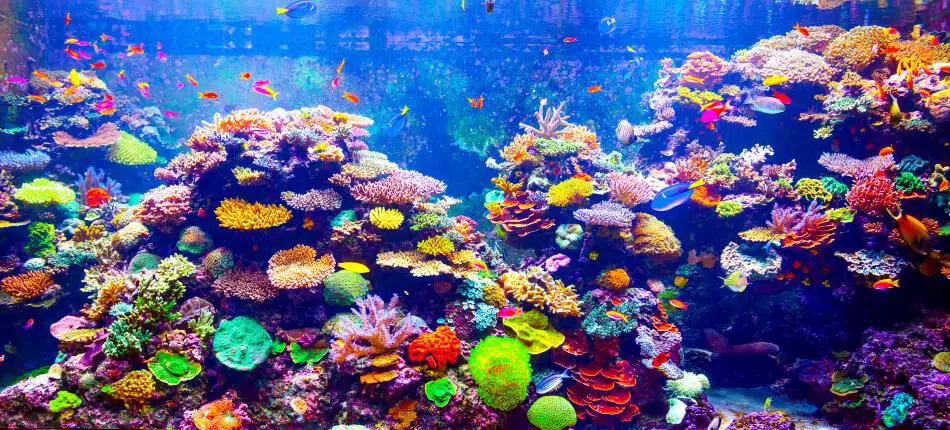
Can You Touch Corals?
Corals are sensitive. A single human touch can cause the spread of bacteria, which can eventually destroy the coral. No matter how much the voice in your head wants you to touch the pretty corals, don’t do it.
They may look tough and strong, but corals are quite fragile. Their outer protective layer starts depleting when touched, which acts as a gateway for harmful bacteria and algae to consume it. If not that, stronger movement can break off the coral.
What to Do When Diving in the Coral Reefs
Here is a set of guidelines of what you should or should not do when diving among coral reefs:
What to Do
- Do your research about the things which can hurt coral reefs.
- Avoid coming into direct contact with the coral entirely, but read up on how much contact is detrimental to it.
- Follow safe diving guidelines and don’t unnecessarily stray off course.
What Not to Do
- Take extra care to stay away from the coral.
- Don’t let your diving equipment follow along, grazing and trampling the coral. Secure it in place and don’t have any loose items.
- Make sure you don’t carry any small items, especially plastic ones which can fall in the water.
- Most people love to keep mementos of the places they visit. Don’t feel inclined to take some coral back with you. If you’re that interested, take a picture rather than killing some coral.
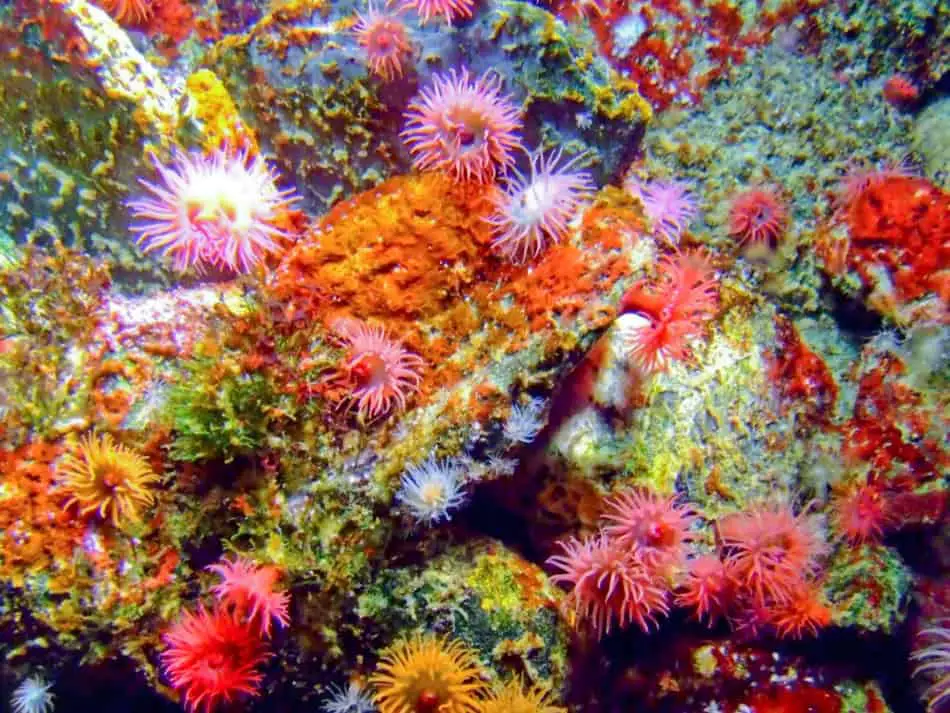
How to Avoid Disturbing Coral Reefs
As a diver, it’s your responsibility to avoid touching and disturbing corals reefs. It takes time and practice to maintain control over where you dive to avoid affecting the coral. You can even obtain certification to become a coral reef diver.
Certification for Becoming a Coral Reef Diver
It’s not too difficult to avoid damaging coral reefs as you dive. All you need to do is be alert in the water and practice maintaining your control while dealing with the water pressure.
There are diving courses available to help you out. With the right training, you can reduce the damage inflicted on coral reefs due to reckless diving.
If you’re already a scuba diver, getting the right training for reef diving won’t be difficult. With some basic steps, including being conscious about the composition of the water you’re diving into, you can avoid unnecessarily trampling or breaking corals.
What Can a Scuba Diver Do to Protect Coral Reefs?
You don’t have to give up your favorite water activities to protect coral reefs. Just take care of a few basic things:
- Don’t toss your water bottles or other small plastic items in your boat or at the beach. These can fly off and land in the ocean. Make use of reusable (or even biodegradable) water bottles.
- Keep track of where you are in the water. If you are near a coral reef, take extra care to avoid disturbing it in any way.
- If you see other divers making such mistakes, guide them too. Or ask the person in charge to do so.
- Be cautious about disposing your trash at the beach.
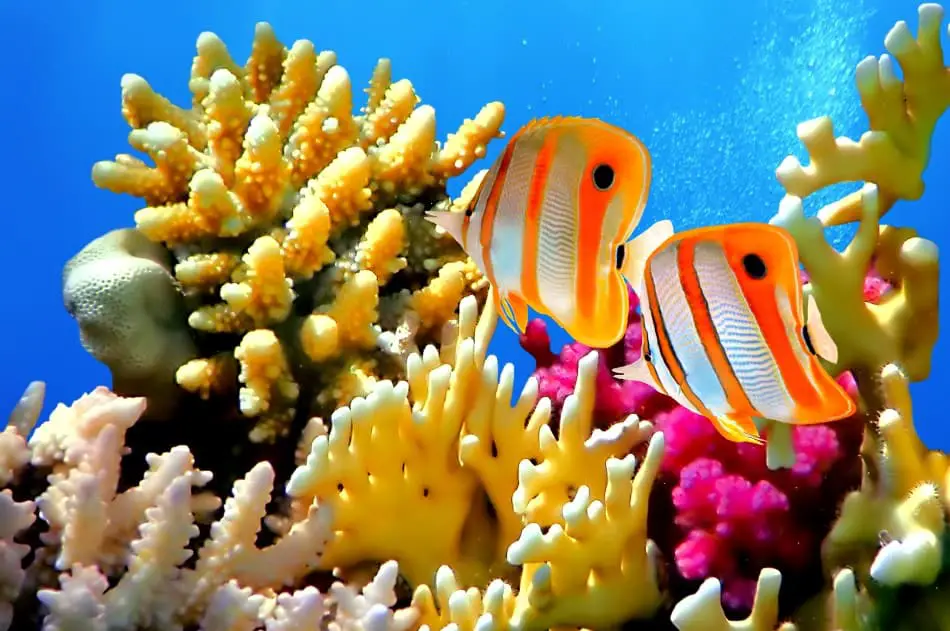
What Are the Best Coral Reefs to Dive?
If you take the right precautionary measures, you should definitely dive to see the beautiful coral reefs in person. Here are some of the best places globally to see coral reefs:
The Great Barrier Reef, Australia
Once considered to be the largest and most beautiful coral reef in the world, the Great Barrier Reef has depleted over time. However, it is still among the top locations chosen by many coral reef scuba divers. This incredible reef is larger than some countries and is estimated to be the size of 900 islands!
The Palancar Reef, Mexico
This one is famously known to be an “underwater garden”. Apart from the beautiful coral, fascinating sea creatures like lobsters, parrot fish and stingrays also roam these waters. The corals appear to be like a display of underwater flowers.
Wakatobi, Indonesia
There are countless different types of corals, many of which are found in Wakatobi. This place holds great importance, especially for researchers studying coral. Some of the corals are so massive that they are as big as boats.
Grand Cayman, Cayman Islands
If you want to witness the growth and formation of a coral, this is the place to go. New corals make a grand entrance, complete with smoke and floating confetti-like coral.
If you don’t get to witness this great spectacle, don’t worry. The coral itself is big, colorful, beautiful and definitely worth the visit.
The Red Sea
The water currents in the red sea act as a breeding ground, which encourages the growth of coral. The warm waters are conducive for the healthy growth of the coral.
Fiji
Fiji has dense, underground forests of coral, mostly the soft ones. Here, you can get the opportunity to swim through a passage naturally built by the coral itself. Imagine being immersed in a bed of corals!
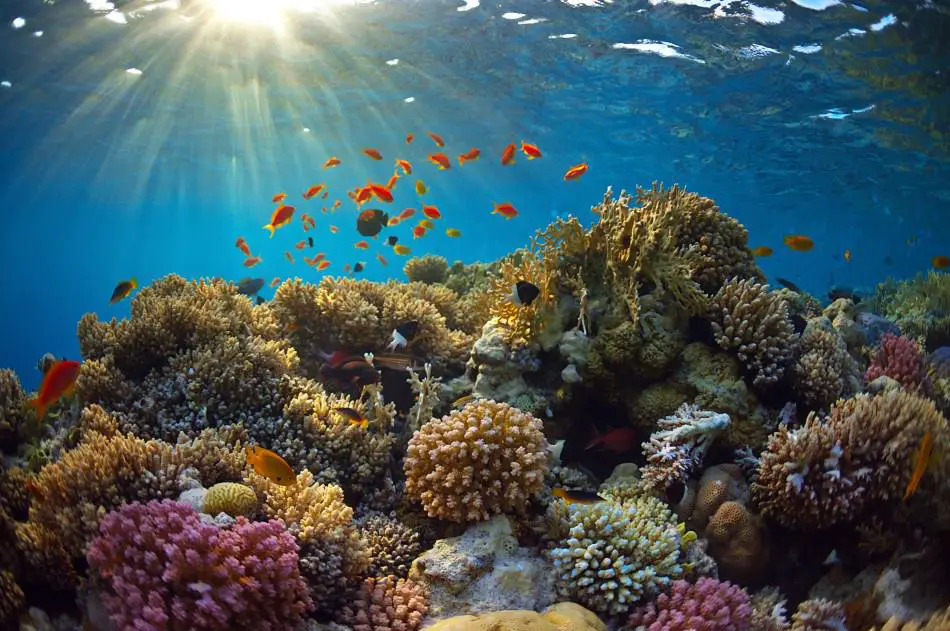
Protect Coral Reefs
There’s no harm in wanting to enjoy nature’s craftsmanship. Just like you would love to visit a beautiful flower garden on land, you would want to visit a beautiful and colorful coral reef.
It is essential, however, to remember that these reefs are not just a source of human entertainment; they are a significant part of the world’s ecosystem. By purposely breaking them or accidentally stepping over or squishing them, you damage not only the coral reefs but also a sanctuary and source of nourishment for many sea creatures.
With the right training and care, you can scuba dive among coral reefs without negatively impacting them. Make sure to do proper research before you go!
Taking Initiative
A little step goes a long way. If you’ve become aware of the importance of coral and proper diving precautions to take when diving in coral reef areas, you can take the next step by spreading the word.
You can either join the existing awareness campaigns dedicated to protecting coral reefs, or just start off by informing the people around you about this. You can also join hands with your local dive schools and diving facilities to properly inform divers before they jump into the water.
By following the safety guidelines for coral diving, you can play a part in protecting the coral reefs from further damage and save these fascinating, colorful organisms.

